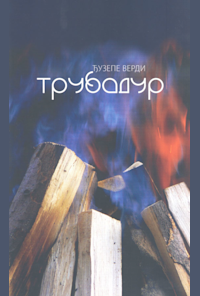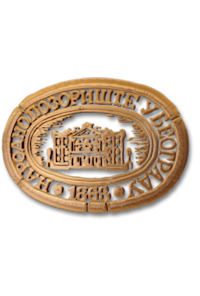Verdi's Troubadour was first performed on the stage of the National Theater on April 24, 1913, directed by A. I. Andrejeva and in the decor made according to the designs of V. В. Baluzeka. The orchestra was conducted by Stanislav Binički
(... To be guessed) that Binički prepared his play 'strategically', that he and his protagonists had it in mind throughout 1912 (...) and when it was finally staged on April 24, 1913 at the National Theater. the curtain on the premiere of Troubadour - it was the beginning of the realization of a long and feverish dream, which both Binicki and his protagonists will so violently and unprecedentedly 'finish', performing six operas in one year (...). What's more, it can and must be said, according to what their Troubadour ismeant for the victory of the 'opera idea' and according to the way it was accepted, that the date of that premiere was real and the only date of the founding and beginning of the Belgrade Opera, i.e. April 24, 1913 ”(Slobodan Turlakov Verdi in Belgrade ). "But the significance of the premiere of Troubadour was not only in the success of the play. That premiere was an occasion to seriously consider establishing a permanent opera ensemble. This opinion was supported by the fact that the protagonists of the Troubadour were mostly local singers, members of the drama ensemble of the National Theater: Draga Spasić (Leonora), Teodora Arsenović (Acučena), and Vojislav Turinski (Manriko). Rudolf Fejfar, baritone of the Ljubljana Opera, played the role of Count Luna. (...)
But there were also harsher judgments of critics, although everyone pointed out that Verdi's Troubadourfor our occasion, it was well performed except for considerable remarks at the expense of the orchestra as well as the choir. (...) The premiere of Troubadour also marks the beginnings of opera directing in our country. The direction of this popular opera was entrusted to the newly hired Russian artist Andrejev. According to critics, his directing was not traditional, nor 'stereotypical, cabotanic and banal'. "(Rasko Jovanovic Prehistory of the Belgrade Opera ). On Monday, February 4, 1929, "for the first time in new equipment", the Troubadour was performed translated by Milan Dimović (conductor Mr. Matačić, director Mr. Kintl, Count Luna Mr. Ertl, Leonora Mrs. Žaludova, Acučena Mrs. Pinterović, Manriko Mr. .Šimenc). The next premiere of Troubadourit was at the same time the first post-war screening of this opera in Belgrade. It happened on Thursday, June 28, 1951, under the baton of conductor Predrag Milosevic and directed by Josip Kulundzic. The role of Luna was sung that evening by Stanoje Janković, Leonora Zdenka Zikova, Acučene Melanija Bugarinović, and Manrika, as a guest, Boris Marinov, a member of the Zagreb Opera. The play was "decorated" by Stasa Beložanski, "costume" by Mara Trifunović, and the choirs were prepared by Milan Bajšanski. Sixteen years later, once again translated by Milan Dimović, Nikola Mitić (Luna), Milka Stojanović (Leonora) Đurđevka Čakarević sang and as a guest, Salvatore Puma, a tenor from Milan (Manrico). That evening, June 29, 1967, conducted by Borislav Pašćan. Director Arsa Jovanović. Decor designed by Vladimir Marenić, costume designed by Ljiljana Dragović. "Out of a desire to unburden," deromanticizes and purifies the libretto resulting in a performance of quite certain stylistic qualities. Although there were very noticeable directing innovations, although the static choirs in some places resembled an oratorio, the musical values remained in the foreground while the course of the drama was both understandable and interesting "- wrote in his review an unsigned critic of" Politika "(Troubadour in a New Movement, July 5, 1967). Maria Koren liked the play even more - in an article entitled With Taste and Measure published in Borba on July 1, 1967, she wrote that "the measure, taste and culture of Arsa Jovanović and Borislav Pašćan and the harmony of their conceptions saved Troubadour even those the weaknesses that he objectively carries, enabled us to experience him as a subtle musical-psychological story of great suggestiveness and beauty. " Ten years passed and in the spring of 1977, the Opera of the National Theater prepared a new production of Troubadoursdirected by Borislav Popović; the conductor was again Borislav Pašćan. Two premieres were held: in Kragujevac, in the Šumadija Hall, on Friday, April 22 (Vladeta Dimitrijević as Count Luna, Radmila Smiljanić as Leonora, Breda Kalef as Acučena, Stojan Gančev as Manriko), and in Belgrade, of course at the National Theater. on Saturday, April 23 (Count Luna - Zoran Aleksandrić, Leonora - Slavka Popović, Acučena - Đurđevka Čakarević, Manriko - Zvonimir Krnetić). The decor in this production was designed by Miomir Denić, and the costumes by Ljiljana Dragović. However, Stana Đurić-Klein, then a critic of "Politika", made a serious objection to this play, which is simply summed up in the title of her article - Return to the Old. "The Belgrade Prime Minister we have seen now is not a Prime Minister because many previous performers take part in it: conducted by Boris Pašćan, although less precisely, enthusiastically and harmoniously than at the premiere ten years ago; that in the role of Acucena, Đurđevka Čakarević once again showed her recognized vocal qualities, but with the routine of a prima donna who crossed many world stages; that in the interpretation of Manrik, Zvonimir Krnetić renewed one of his, in all components (in diction, phrasing, acting) mature and beautifully shaped role; that Slavka Popović in the role of Leonora, obviously indisposed and therefore deconcentrated, sang her part below her usual standard and in a way that did not correspond to the Prime Minister's presentation. "(Politika, May 6, 1977). In her new setting, TroubadourThis year, in 2001, he gathered some of the most important artists and collaborators of the Opera. The play, as her debut director, was staged by Ivana Dragutinović, who graduated in opera directing from the BK Academy of Arts in 1999, in the class of Mladen Sabljić.




